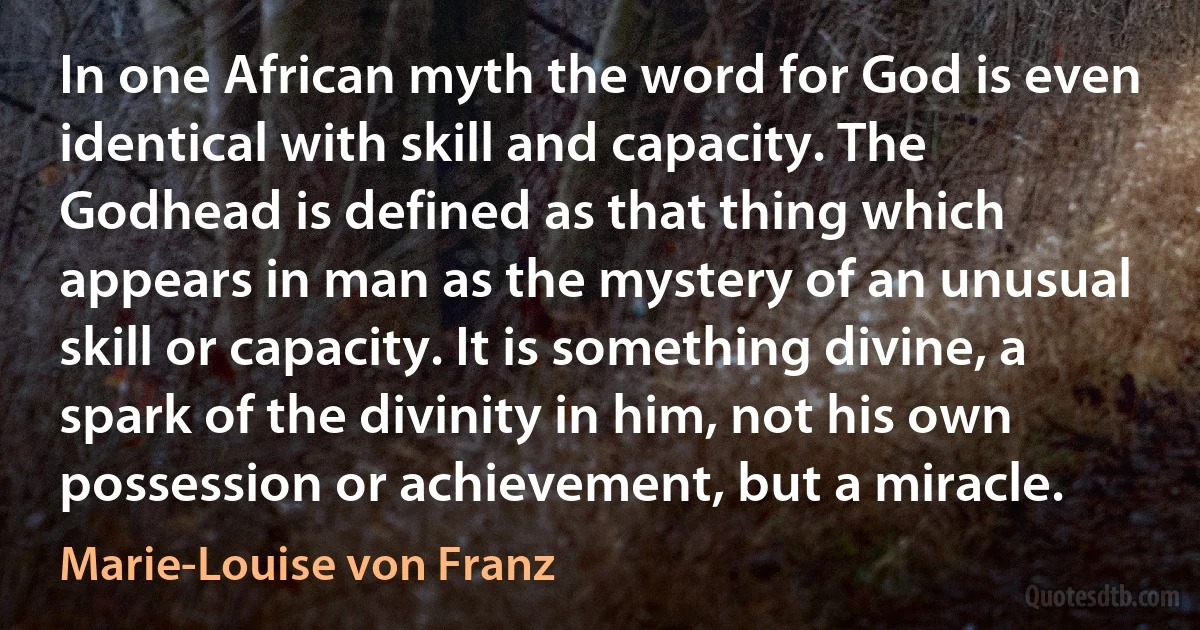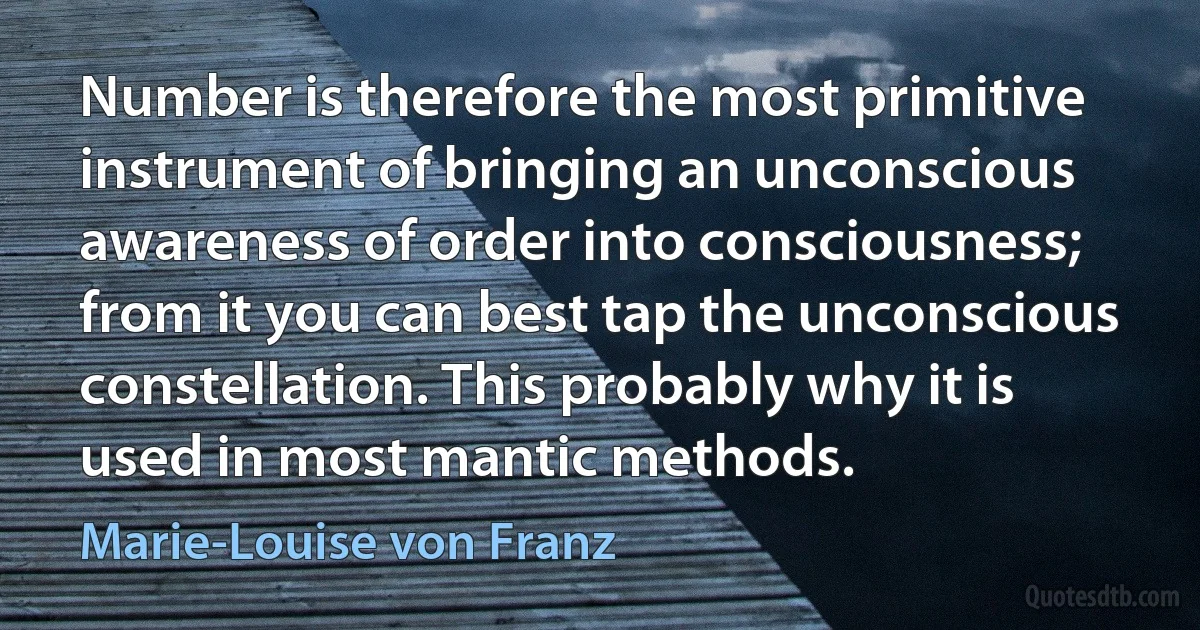Marie-Louise von Franz quotes
Many myths and fairy tales tell of a prince, who has been turned into an animal or a monster by sorcery, being saved by a woman. This is a symbolic representation of the development of the animus toward consciousness. Often the heroine may ask no questions of her mysterious lover, or she is only allowed to meet him in darkness. She is to save him through her blind faith and love, but this never works. She always breaks her promise and is only able to find her beloved again after a long quest.

Marie-Louise von Franz
To sum up: numbers appear to represent both an attribute of matter and the unconscious foundation of our mental process. For this reason, number forms, according to Jung, that particular element that unites the realms of matter and psyche. It is "real” in a double sense, as an archetypal image and as a qualitative manifestation in the realm of outer-world experience.

Marie-Louise von Franz
The favorite themes that the animus of the woman dredges up within her sound like this: "I am seeking nothing but love, but 'he' doesn't love me." Or, "There are only two possibilities in this situation," both of which of course are unpleasant (the negative animus never believes in exceptions). One can seldom contradict the animus, for it/he is always right; the only problem is that his opinion is not based on the actual situation. For the most part he gives utterance to seemingly reasonable views, which, however, are slightly at a tangent to what is under discussion.

Marie-Louise von Franz
The way the anima initially manifests in an individual man usually bears the stamp of his mother's character. If he experienced her in a negative way, then his anima often takes the form of depressive moods, irritability, perpetual malcontent, and excessive sensitivity. If the man is able to overcome these, precisely these things can strengthen his manliness. Such a negative mother anima will endlessly whisper within a man: "I'm a nothing," "It doesn't make sense anyhow," "It's different for other people," "Nothing * gives me any pleasure," and so on. Continual fear of disease, impotence, or accidents are her work, and she constellates a general sense of gloom. Troubled moods like these can intensify to the point of temptations to suicide; thus the anima can become a demoness of death. She appears in this role in Cocteau's film Orpheus.

Marie-Louise von Franz
The ego must be able to listen attentively and to give itself, without any further design or purpose, to that inner urge toward growth. People living in cultures more securely rooted than our own have less trouble in understanding that it is necessary to give up the utilitarian attitude of conscious planning in order to make way for the inner growth of the personality.

Marie-Louise von Franz
Number, as it were, lies behind the psychic realm as a dynamic ordering principle, the primal element of which Jung called spirit. As an archetype, number becomes not only a psychic factor, but more generally, a world-structuring factor. In other words, numbers point to a background reality in which psyche and matter are no longer distinguishable.

Marie-Louise von Franz
The "ultimate" questions referred to above do not always come up in the encounter with the shadow. Much more often behind him or her another inner figure emerges as a personification of the unconscious. This takes the form of a woman in a man, and in a woman, that of a man. Often it is they who are at work behind the shadow, throwing up new problems. C. G. Jung called them anima and animus. The anima embodies all feminine psychic qualities in a man-moods, feelings, intuitions, receptivity to the irrational, his personal capacity for love, his sense of nature, and most important of all, his relationship to the unconscious.

Marie-Louise von Franz
The embodiment of the unconscious of a woman as a figure of the opposite sex, the animus, also has positive and negative features. The animus, however, does not express itself so often in women as an erotic fantasy or mood, but rather as "sacred" convictions. When these latter are expressed loudly and energetically in a masculine style, this masculine side of a woman is easily recognizable. However, it can also manifest in a woman who appears very feminine externally as a quiet but relentless power that is hard as iron. Suddenly one comes up against something in her that is cold, stubborn, and completely inaccessible.

Marie-Louise von Franz
As the anima does with men, the animus also creates states of possession in women. In myths and fairy tales this condition is often represented by the devil or an "old man of the mountain," that is, a troll or ogre, holding the heroine prisoner and forcing her to kill all men who approach her or to deliver them into the hands of the demon; or else the father shuts up the heroine in a tower or a grave or sets her on a glass mountain, so that no one can get near her. In such cases, the heroine can often do nothing but wait patiently for a savior to deliver her from her plight. Through her suffering, the animus (for both the demon and the savior are two aspects of the same inner power) can be gradually transformed into a positive inner force.

Marie-Louise von Franz
There is a beautiful tale among the Australian aborigines which says that the bow and arrow were not man's invention, but an ancestor God turned himself into a bow and his wife became the bowstring, for she constantly has her hands around his neck, as the bowstring embraces the bow. So the couple came down to earth and appeared to a man, revealing themselves as bow and bowstring, and from that the man understood how to construct a bow. The bow ancestor and his wife then disappeared again into a hole in the earth. So man, like an ape, only copied, but did not invent, the bow and arrow. And so the smiths originally, or so it seems from Eliade's rather plausible argument, did not feel that they had invented metallurgy; rather, they learned how to transform metals on the basis of understanding how God made the world.

Marie-Louise von Franz



